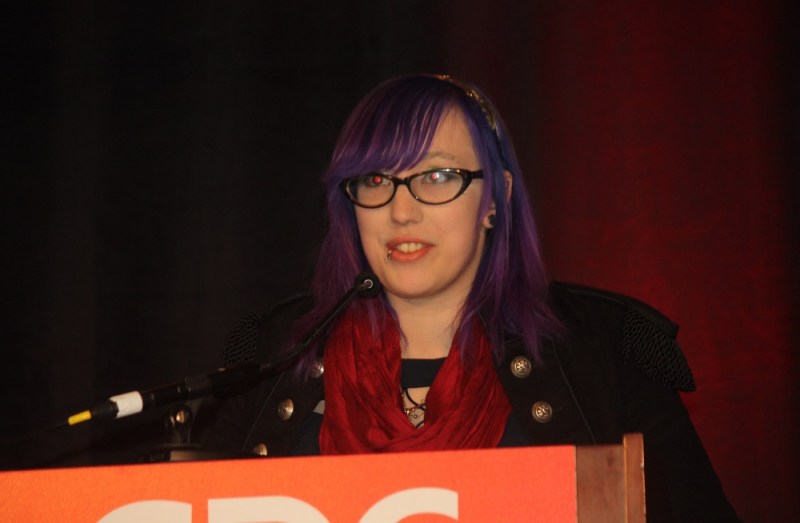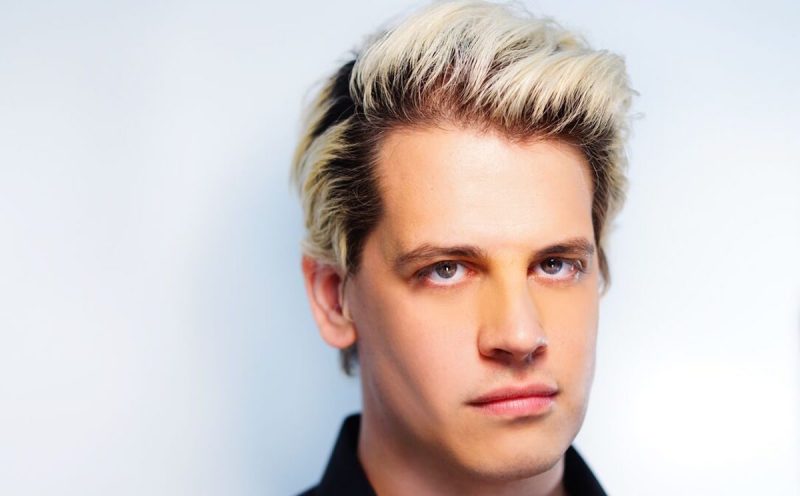
Above: #GamerGate as seen by CNN in 2014.
GamesBeat: There are different parts in the book where you note that people really didn’t stand up with you. The industry would express support privately, but wouldn’t come out publicly. Friends would often be in the same position, where they were just too afraid to come to your defense.
Quinn: It changes from day-to-day. I can feel a bit bitter sometimes. It seems like some people who didn’t say anything or didn’t believe it back when all this was happening to me are suddenly like, “Oh, wow, hey, guys, I just figured out that this is a problem.” I’ve been saying this for so long. But at the same time—I’m just redefining my own expectations of people. It was naïve or immature of me to want to be able to change people’s minds overnight. The way people grow and learn—my goal should be to plant seeds.
I think back on all the times that my mind has changed about things or I’ve learned new things. Usually it wasn’t an immediate epiphany. Sometimes I just needed to look at something from a specific angle or hear it enough. Nobody knows everything right out of the gate. I try to have patience with all that.
The thing that makes me sad—I had a hard conversation with someone close to me recently. I get why people wouldn’t want to stand up. If nothing else, what happened to Phil Fish immediately after he stood up made it pretty clear that there were consequences for it. I don’t want people to get hurt on my behalf. But it’s one of those things where if there was a critical mass, I think things would have gone differently. But because the stakes were so high, I don’t know how we would have gotten that critical mass at that time.
The thing that makes me frustrated is sometimes hearing from multinational companies that have so much more resources, that would be so much safer than I was, telling me that they saw it and they felt bad about it but they couldn’t do anything about it. You could have maybe reached out privately and asked if I was okay? It’s not a bitterness. It’s just a sadness. I do understand why it happens. Everyone’s busy. Everyone has real lives.
I’m still irritated by people who caused harm in the way that they did speak up. The ones that were like, “Some people say it’s about harassment, but others say it’s about ethics in game journalism.” That’s the thing I take issue with. Anybody that wrote about it and would say, “Zoe Quinn was accused of having sex for reviews,” but would never clarify that that was a completely fabricated idea, that it was demonstrably false. They were just spreading the accusation.
GamesBeat: There was a false equivalency there, where they felt, “Well, I have to be fair to people who disagree.”
Quinn: Right. The problem with the false equivalency is when it comes to plain disinformation — information that’s not only false, but being maliciously spread to hurt someone – if you think that fairness there is standing somewhere in the middle, the middle point between the truth and a lie is still a lie. Few things are as clear-cut as “This literally never happened.” If we can’t say that, that’s not being fair. It’s the opposite.
I was silently recording the places these people were congregating and coordinating the abuse. They capitalized on that. They counted on that. They would bully publications into putting that in there if the writer didn’t do it originally. Maybe the writer did their job right, but they’d bully the editor, bully their advertisers. That’s what I’m frustrated by.
Even now, it’s been three years, and people who are not Gamergaters – who are just well-meaning people – think I slept with someone for a good review of a game that, A, was free, and B, never got a proper review anywhere. People just wrote about it because they played it and they had a feeling about it. It’s not as if I had review scores. It’s not that kind of game. They think I needed to get exposure at Kotaku? I had already written for Kotaku. It’s not as if I wasn’t on their radar or didn’t have a press contact there. I don’t know why I would have needed to sleep with someone.
It’s just infuriating that it was given any credence. Any time a major company reacted to them, whether it was Intel, or Kotaku saying they were going to revise their ethics policy. You guys are giving them legitimacy. You’re making it look like I did something, like this is a real thing and not just a lot of people hurting other people. It felt like the industry didn’t want me.
GamesBeat: In retrospect it feels like the beginning of the age of “fake news.”
Quinn: Exactly. The super mindfuck of it for me—the fact that Breitbart saw—I did an interview with someone two days ago who had read Steve Bannon’s memoir thing. They specifically used me to get to the gamer demographic, because these guys had already been involved with the games community to some extent and saw that there was a demographic to pander to, that was ready to hear the kind of invective that inspired what we’re calling the alt-right. They were primed to go for this. And they used me to do that.
GamesBeat: They also take offense about a line you draw from Gamergate to Milo [Yiannopoulos] to the alt-right to Donald Trump. Maybe that is unfair, to say everyone who’s in the alt-right was a Gamergater. Of course, if this one cause leads to another, it seems like you have to take some responsibility for it.
Quinn: It’s not as if anybody forced you to be a Gamergater. You opted in to that. If there was some cool club with 100 people in it and we had a shared interest in, I don’t know, skateboarding or something, and 70 percent of those people were also in the KKK, I probably wouldn’t want to be in that club anymore. I can probably go do the things I care about with people who aren’t neo-Nazis. I don’t have to adopt this label.
Nobody made you be a Gamergater. Nobody’s trying to make you defend this movement that has overwhelmingly been harmful. If I wrote a book just about Gamergate, digging into the specific tactics where they were trying to figure out charities to donate to and whitewash the harassment—there was an entire Github repository I have archived with these “operations” to cover up the nasty stuff they were doing. If you’re participating in something that deceitful, that’s trying to cover up the fact that it’s about harmful harassment, sexism, racism, hate, all this stuff that made up the alt-right, why wouldn’t you just step away from that? Why would you not be disgusted and put off by that? Whoa, hey, I’m out.
If nothing else, don’t let yourself be used to lend legitimacy to that sort of thing. Don’t defend the Gamergate movement from being called what it is. A movement isn’t a person. Shouldn’t you be more concerned with the harm being caused than the image of the group that’s by and large causing that harm? Where are your priorities there?

Above: GamerGate tweets in 2014.
GamesBeat: When you think about some of this, going back, is there anything positive you remember? Any surprising acts of kindness that stand out to you?
Quinn: It’s been interesting meeting a lot of people who have been through this sort of thing and had no one else to talk to about it. There’s a beauty in that.
The thing that’s been the wildest about going on tour with this book has been meeting face to face with some of the people I helped through Crash, when the hotline part was still going. I don’t usually know these people’s faces. I’ve dealt with thousands of cases at this point and I can’t remember all of them. Just being surprised at meeting that person face to face and seeing that they’re okay. It’s hard for me to even wrap my head around or express how wild that is, and how grateful I am for them. This stuff is always a two-way street. It wasn’t for nothing, you know? All of this wasn’t for nothing. Still being here, still being able to make games.
If there’s one thing that’s nice in all of this—I play a lot of Overwatch, and I grouped up with this random kid I met. We played maybe 10 games together. We were both support mains, and when you’re trying to play solo queue that gets pretty hard. It’s a mess trying to coordinate six people you don’t know in a team game for competitive points. People get really intense. It was like, “Oh, cool, another person who’s good at the same specific underplayed role as me.”
We played a bunch of games together and started talking about our lives. I slipped that I was trying to finish a game and he says, “Oh, cool, you make games. Anything I would have heard of?” “Ah, no.” He’s just this 23-year-old guy. What if he was a Gamergater? What if he was one of these people? I said, “You’d be able to figure out who I am pretty easily, so I don’t really want to say.” He said, “Okay, that’s fine.” We became actually decent friends over months of playing video games together. I ended up emailing him, and I was pretty worried because my name is on my email. How’s he going to react to it? And it just wasn’t a thing.
He said, “I know a lot of game developers come to Seattle for PAX. I’ve never been, but it might be nice to meet you.” He’d been sending me little emails, super nice kid. I said, “I can get you passes, no problem. I do a bunch of speaking stuff there. If you want to come with me, I need people to help.” He says, “Oh, could you get one for my girlfriend too? I don’t want to go without her” And it’s like, wow, this isn’t even a crush thing. Sure, you can both come with me to PAX, this is great. I met them in person and they’re both super sweet.
We walked a few steps and somebody who I helped with Crash came up and was talking very openly about her case and all this stuff with it. It was a super intense case. This kid is off to the side looking at me. We go a few more steps and some fans say, “Oh, we love your work, can we get a selfie?” He’s looking at me again. And then we’re going up the escalator and he says, “Who are you?” “Oh, God, you still don’t know?” He says, “No, the first time we talked you seemed like a pretty private person, so I didn’t want to get into that.” I mean, that’s so nice.
He turned out to be the sweetest person I’ve met in the longest time. We went around PAX and he got to meet a bunch of other indie developers. He’d just dropped out of comp sci the week before, learning how to program. I hadn’t known that. I got an email from him while I was on tour, and he said, “Hey, I just wanted to thank you for that. I’m learning Unity now. I think I want to make games. The indie community seems really great.” It’s just been so nice. I didn’t think I could have that through the internet anymore.

Above: Zoe Quinn speaks about harassment at the Game Developers 2015 event.
GamesBeat: I liked that one line in your book. “This is what you deserve to be known for.” [It was about her advocacy work].
Quinn: Oh, my God. That GDC comment—I don’t know. I will probably never know who left that feedback, but that’s what I want to—I’ve tried to find my way back to myself. Keep making games. Keep making it easier for other people to make games. I don’t want the stuff that’s happened to me to override who I am as a person. Ultimately I want to make this a footnote in my life. That might be naïve and overambitious, but I still really love games, really love the internet and the people in it.
GamesBeat: Is the work related to Depression Quest something you think you want to continue with?
Quinn: The majority of my work in games, outside of Depression Quest, has been experimental pushes into comedy games. I think there are a lot of intersections there. I did stand-up comedy a long time before game development. There’s some overlap between comedy and depression and stuff like that.
I do want to just do something light for my next project. The game I’m working on, The Tingler, has been really good for that. It’s a game about love. I throw so much of myself into my work. Being able to throw myself that’s just loving and kind, not something about suffering for once, it’s been great to get back to that.
That said, I have definitely considered trying to make a game about what PTSD feels like. I feel like it’s pretty poorly understood and represented in the media right now, and that keeps people from getting help. It kept me from getting help for a very long time. I just didn’t understand what it was or what it’s like. “That’s something soldiers get, right?” But that will have to wait for when I have less on my plate than I do right now.
GamesBeat: It seems like falling back on creativity is a good answer.
Quinn: Something we share in common—both of our things started with a lie, but they were ultimately used by people who have a very narrow idea of games what can be or should be. They don’t want games to be anything else. “If you can’t play a hard game, you’re not a real gamer.” That drives a lot of stuff, “You’re not a real gamer.” The cool thing about games is that they can be almost anything. There’s room for all of us here.
GamesBeat: The last thing I want is to see people look at how I got treated and just run in the other direction. “I’d better not post anything about games.”
Quinn: The thing about all of this that’s frustrating, going out and doing interviews about the book—I’ve interacted with so many people who have nothing to do with games. “No, I swear to God, this isn’t everybody in games. This isn’t what games have to be.”
I’m not apologizing for the medium, but it feels like so much damage has been done to dissuade people from getting involved with games. That makes me sad, because so much of my work has been trying to do the opposite. I’m trying to design for people who don’t think there’s a game out there for them, or who wouldn’t know what to do if you handed them a dual-stick controller. I playtest with my friends’ parents a lot, just to see how intuitive my design is for people who don’t already know what to do in games.
I want more people in this medium. I want it to keep growing. I think it’s really cool. I want other people that would love it, who don’t know they would love it, get to find it and fall in love.
GamesBeat: It looks like you’ve found several different callings here, between Crash Override and making your own games.
Quinn: There’s always way too much to do.


